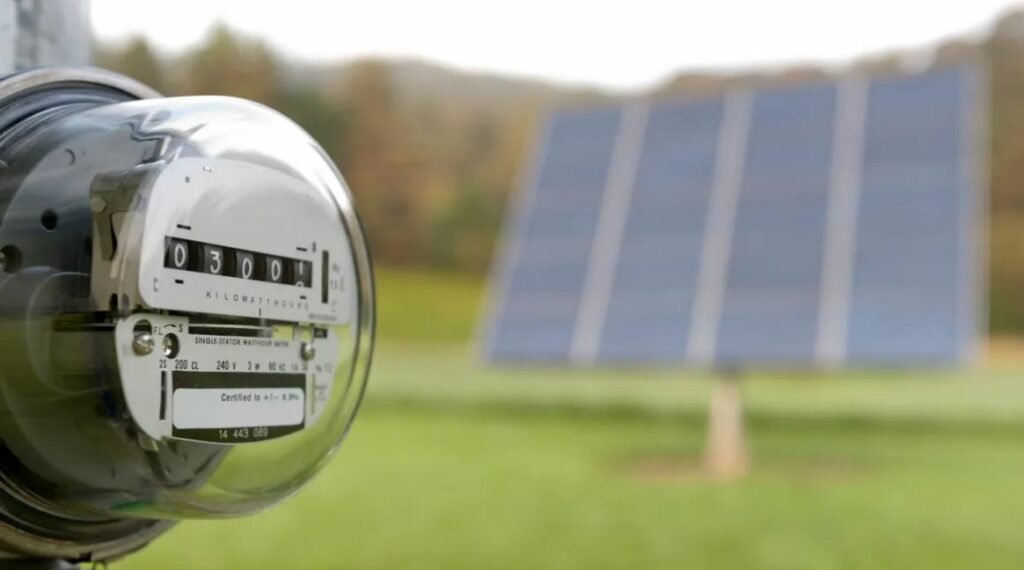Solar power is a growing trend and for a good reason. Solar panels are an excellent way to help the environment and save money simultaneously. But can you make money with solar panels on your house?
The answer is yes. Having a solar panel installed on your home is a great way to save money, get incentives like tax breaks, and even generate revenue on the side. Having solar panels installed in your homely be a profitable passive investment.
Several ways to make money with solar panels on your house exist. Each method has its benefits and drawbacks, but it’s essential to understand them all if you’re thinking about going solar.
How Can I Make Money From Solar Panels On My House?
Solar panels are becoming increasingly popular to save money on electricity bills. Some people are making money from solar panels. For example, you can sell excess energy back to your utility company or your extra power to your neighbors, friends, and family at a lower price than they pay their utility company.
There are three easy ways to make money from solar panels: Net Metering, solar panel leasing, and solar investment tax credit.
1. Net Metering

Net Metering is a billing mechanism that allows you to sell back your solar power to the utility during the day when your panels produce more electricity than you use. Net Metering is also called “feed-in tariff” or FIT.
Net Metering works in conjunction with net billing. With net billing, you pay only for the electricity you use, while with net Metering, you get a credit if the solar power produced by your system exceeds your usage. This credit can be applied to future bills or paid directly to you.
Net Metering is the most common method of compensating solar homeowners for excess electricity generation. It’s an easy way to ensure solar homeowners aren’t penalized for using their electricity.
The number of net metering credits varies by state and utility company. If you have enough panels installed on your house, you might be able to sell electricity back to the grid. The amount you get paid for this depends on your state’s regulations. Still, it can be anywhere from $0.10-$0.25/kWh, comparable to what you pay for electricity from your local utility company.
If you don’t want or can’t sell your excess energy through net Metering, then consider bartering it with someone who does need it but cannot afford it on their own. This can happen between neighbors or businesses near or even between states or countries if they have agreements.
2. Solar Panel Leasing

Solar panel leasing is an agreement allowing you to receive all the benefits of going solar without purchasing or installing the panels yourself. The company leases the meetings and will pay for everything, including installation and maintenance. When it comes time to sell your home, you’ll be able to take these panels with you and not worry about them affecting the price of your home.
Here’s how solar panel leasing works.
First, you sign a contract with a solar company. This contract will outline all of the details of your lease, including the length of time, monthly payments, and any penalties if you break the lease early.
Second, they’ll send someone to install their equipment on your roof. Some companies will even finance this purchase for you to include it in your monthly payment!
Next, you pay for electricity using a special meter which tracks how much energy each panel produces every month. You don’t have to worry about paying extra for shade or cloudy days because these panels produce electricity even when it’s cloudy outside!
You can make money with solar panels on your house. You can lease your roof space and make money from the energy your panels produce, or you can buy and install the panels yourself and sell the power directly to your utility.
Solar panel leasing makes sense for many homeowners because it requires little to no upfront investment, but it’s not the best option for everyone. Leasing allows you to participate in solar without any up-front costs or construction work required.
Solar leasing companies usually have extensive experience installing and maintaining solar systems. So, if you don’t know much about how they work or how long they’ll last, it may be wise to stick with a company with proven track records before trying.
3. Solar Investment Tax Credit

The Solar Investment Tax Credit (ITC) is a 26 percent federal tax credit for residential and commercial solar systems. The distinction is worth $0.0030/kWh of electricity generated by your solar panels, which means that if your system produces 5,000 kWh of electricity per year, you’ll get a $1,500 tax credit at the end of the year!
If you’re considering installing solar panels on your house, this could be an excellent opportunity to save money on your energy bills. To qualify, you need a system that costs at least $3 per watt (or roughly $15,000 on a 5-kilowatt system). This means that the size of your system must be at least 5 kilowatts (5kW), or about six panels.
You’ll also need an electrician who can handle permits and inspections; if you’re doing it yourself, check out this guide to installing solar panels on your roof.
The tax credit is most valuable for new construction but can also be applied to existing homes.
The Solar Investment Tax Credit (ITC), introduced in 2006, has created an average annual growth rate in solar of 52%, according to the Solar Energy Industries Association.
The Solar Investment Tax Credit (ITC) is a federal tax credit that helps offset the cost of buying and installing solar panels. Homeowners may be eligible for the ITC and you can own or lease your solar panels.
You can claim this credit on your tax return for any year you own the solar panels, even if you didn’t pay for them until after the year-end. The value of the credit can be up to 30 percent of the cost of the system, depending on how much electricity it produces.
How Much Money Can I Make From Solar Panels On My House?
You can make anywhere from $3,000 to $12,000 per year from solar panels. The amount of money you can make from solar panels on your home will depend on several factors, including state regulations and laws, how much sun your area gets, and how much electricity you use.
Can I Still Earn Money From Solar Panels?
Solar panels are one of the most cost-effective ways to lower your electricity bill, but they can also be an investment that returns money over time. If you own decent panels, you’re free to sell excess power back to the utility company or directly to neighbors or friends with whom you have a net metering agreement.
Is Solar Energy On The House Worth It?
Solar energy is a renewable source of power that is not only good for the environment but also has become a viable option for homeowners who want to lower their utility bills.
Solar energy systems have become so affordable and easy to install that many consider them an investment opportunity. Whether you’re looking for a new roof or want to make your home more eco-friendly, having solar panels always seems like the right call.
How Long Until Solar Panels Pay For Themselves?
The answer depends on many factors, including where you live, how much you pay for electricity, and the type of solar system you have installed. In general, it takes five to ten years for a home solar panel system to recoup its costs.
Is Investing In Solar Power A Good Investment?
The answer is yes! Solar power has revolutionized the energy industry. There are two ways to invest in solar power: buying stock in companies that manufacture solar panels or installing solar panels yourself and selling the electricity back to your utility company, both of which are suitable investments.
Why Are My Solar Panels Not Saving Me Money?
A common misconception about solar panels is that they will save you money immediately. This isn’t true. It takes time for your investment in solar panels to pay off, and even then, it depends on how much electricity you use and how much sunlight hits your roof each day.
Can A House Run On Solar Power Alone?
The answer is yes, but with some caveats. The first caveat is that most homes don’t have enough roof space for solar panels to generate all of their energy needs. The second is that even if you did have enough roof space, it would be difficult to store enough electricity to last through the night or in the coming weeks.
What Do Solar Panels Cost, and Are They Worth the Investment?

Solar energy is one of the most important sources of renewable energy on the planet. It’s free, abundant, and doesn’t pollute or emit greenhouse gases. Solar panels have been around for decades, but they’re becoming more popular each year as their cost decreases and their efficiency increases.
Solar power is a great way to reduce your carbon footprint, but how much does it cost? And are solar panels worth it?
Solar panel costs depend on the size of the system. The average solar panel size for a residential home is about 6 kilowatts (kW) but can range from 4 kW to 10 kW.
The average cost of a residential solar system is between $5,000 and $30,000, but that can vary widely depending on where you live and the size of your home. Smaller systems are usually installed on rooftops or backyards. In contrast, you may install larger ones on commercial buildings or fields. The cost per watt is calculated by dividing the total system cost by the total watts of power it produces.
Solar panel installations set records last year, according to the Solar Energy Industries Association: Over 500,000 new residential solar systems were put on roofs.
Are They Worth It?
It’s no secret that solar panels are good for the environment, but are they good for your wallet too? Solar panels are worth the investment for many reasons: they are efficient, renewable, and cheaper in the long run.
Solar panels produce clean energy that doesn’t deplete resources like fossil fuels. They also don’t have any carbon emissions so they won’t contribute to climate change or pollution.
The cost of solar panels has decreased dramatically over the last several years, leading to more and more people installing them and saving money on their energy bills.
Solar panels convert sunlight into electricity at a much higher efficiency rate than traditional power plants. The average efficiency rate for photovoltaic cells is about 20%, meaning that these devices convert only 20% of the energy from sunlight into usable electricity. Still, newer models have been built with an efficiency rate as high as 35%.
Pros Of Having Solar Panels In Your Home
Solar energy is an alternate source of energy. It is a clean and renewable energy source and will never run out of fuel. It is also one of the most effective ways to lower carbon emissions, which helps decrease global warming. Here are some of the most significant advantages of owning solar panels.
1. Possible Tax Credits
There are tax credits for installing a solar panel system in your home in many states and some countries. These credits may vary depending on the size of panels you install and how much electricity they produce. Before installing any solar panel system, check with your local utility company or state government agency to see if you qualify for any tax credits or rebates.
2. Peace of Mind
A good quality solar panel system can last up to 25 years or more before needing replacement or repairs. Once installed, you will not have to worry about paying high monthly electricity bills and will save yourself thousands of dollars over time.
3. It’s Environmentally Friendly
Solar panels do not pollute the air like other forms of energy such as coal or natural gas do because they do not require combustion in order.
4. Lower energy bills
The cost of electricity continues to rise, and if you’re paying more than you need to for your monthly account, it’s easy to see how you could save money with solar panels. In fact, according to EnergySage, a solar company that researches the solar industry, homeowners who install solar panels can expect to see savings of around 50% on their electricity bills within 20 years! That’s huge considering the average American spends $2,000 annually on electricity alone.
Cons Of Having Solar Panels In Your Home
If you’re considering investing in solar panels for your home then, you’re probably aware of the many benefits that come along with it. But, there are also some drawbacks to installing a solar panel system. Here are some of the most common cons that come with having a solar panel system:
1. Expectations
Solar panels can’t work miracles. They can significantly reduce your energy bills but won’t eliminate them. If you need to run appliances after sundown or during cloudy days, you will probably still have to rely on electricity from the grid.
2. Risk
Solar panels generally last 25 years, but a few things can go wrong. Some boards are damaged by hail, others by falling branches or debris. All systems suffer from degradation due to sunlight exposure over time.
3. Installation costs
The cost of installing solar panels on your home varies but depends on how many panels you want and where you live (solar power generation reaches peak efficiency in sunny climates like Arizona). But expect to pay around $10,000 per kilowatt installed (enough to power an average U.S. home), roughly equivalent to the cost of installing a typical house’s new central air conditioning system with ductwork and vents.
Government and Legislations on Solar Energy (How they Affect earning from your home in the United States, the federal government has subsidized renewable energy for decades. It started with tax credits and rebates, but now there are more complicated subsidies.
Here’s a summary of how these subsidies work:
Tax credits are available to anyone who buys solar panels or other renewable energy equipment. The credits also apply to people who buy electric cars or install wind turbines at home rebates are available only to people who buy solar panels or other renewable energy equipment. You can’t use a rebate to buy an electric car or switch to wind power.
Incentives are available for some types of renewable energy projects but not for others. For example, you can get incentives if you build a solar farm on your property, but not if you install solar panels on your roof (the latter is considered “self-consumption”).
The US government has a variety of tax incentives and rebates for solar panels on your house. These can include:
- Tax credits: You can deduct 26% of the cost of your solar installation from your taxes, including the labor and materials.
- Cash grants: Some states offer cash grants or rebates that will lower the cost of your system by up to 50% or more. These often require additional paperwork, so check with your local utility company before signing up for these incentive programs.
- Net Metering: Net Metering allows homeowners to sell any excess power generated by their solar installations back to their utility company at retail rates minus any fees associated with transmission and distribution charges, as earlier explained.
Solar panels, both in terms of revenue and value, are a long-term investment. It is, therefore, one area to focus on for long-term investments, although it is an excellent opportunity for the solar industry to grow. The potential for making money with solar panels is there if you can afford it and willing to wait for the long-term gains.
With solar panel prices dropping, anyone with a sunny roof has the chance to go solar. As more people do so, utilities must respond by hiring more workers and building more power plants to make up for that extra energy generation.
Finally, installing solar panels on your roof can be very profitable. Using various financing options, some homeowners will earn enough money back from their panels in the first year to pay for all their equipment costs and even turn a nice profit.








